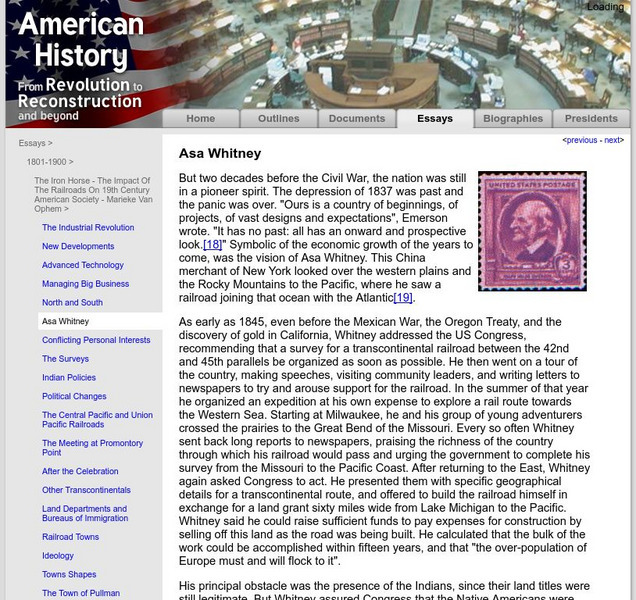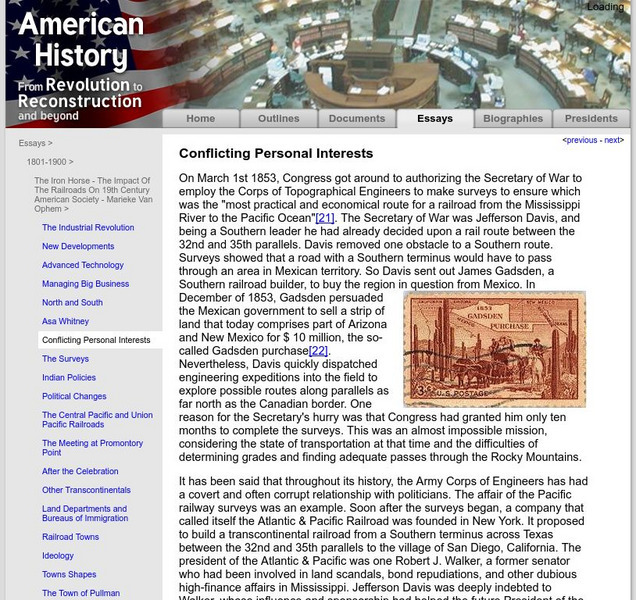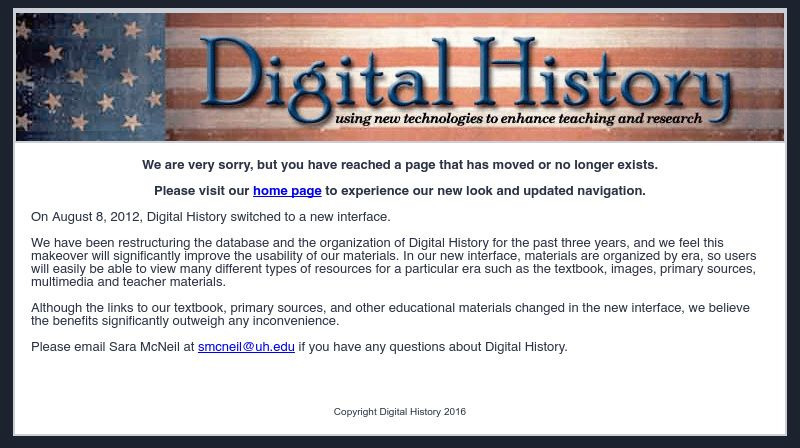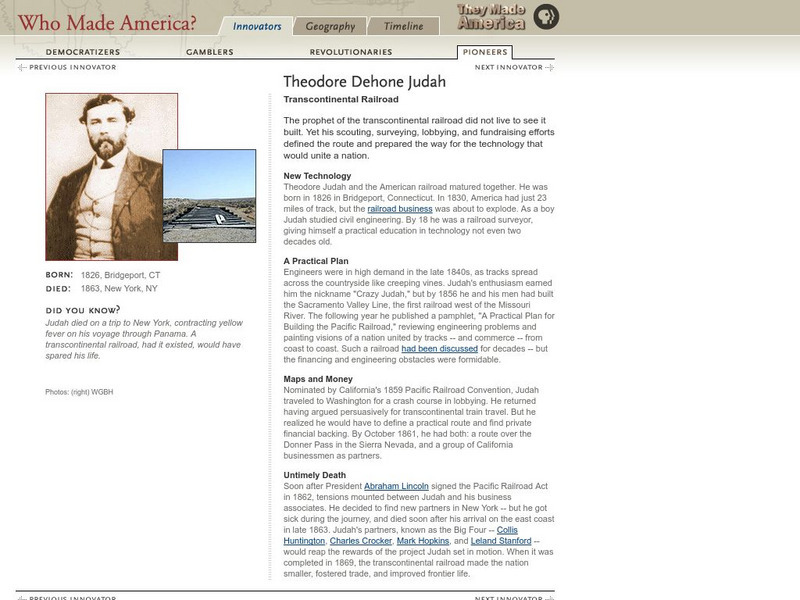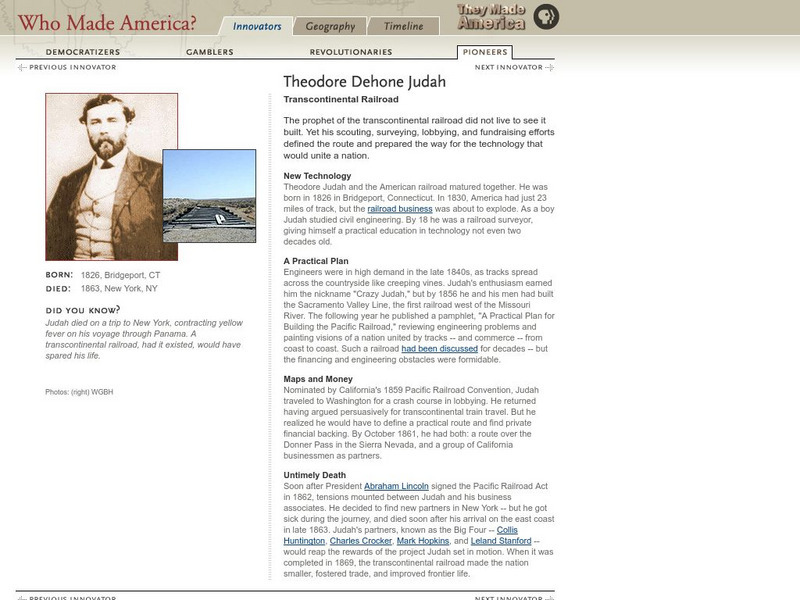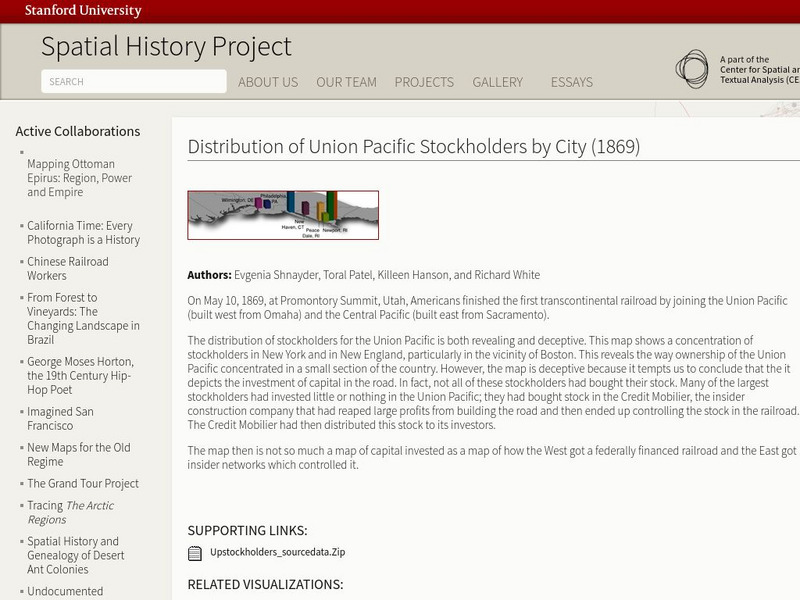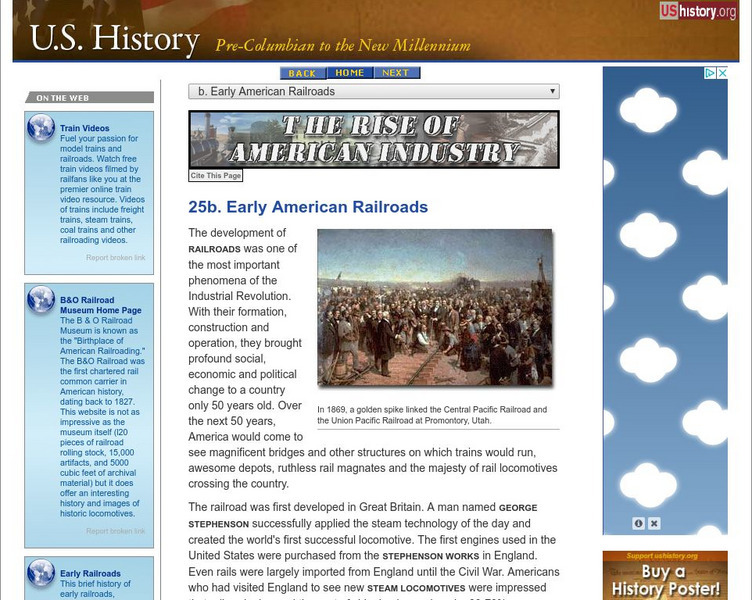Stanford University
Stanford University: Spacial History: Transcontinental Railroad, 1879 1893
The railroad developers built the rails in anticipation of growth and sprawl across the United States. This visual shows the details of the increase of settlements, yet not quite enough to sustain the expanse of the Transcontinental...
Central Pacific Railroad Photographic History Museum
Cprr Photographic History Museum: Constructing the Central Pacific Railroad
From a book written by a civil engineer, John Debo Galloway, this article discusses the construction of the Central Pacific Railroad including construction methods, problems, and the eventual meeting of the rails at Promontory Point.
Central Pacific Railroad Photographic History Museum
Carbutt and the Union Pacific's Grand Excursion
Provides information on the Union Pacific Railroad's grand excursion to the 100th Meridian.
Central Pacific Railroad Photographic History Museum
Cprr History Museum: Pacific Railroad Explorations and Surveys of 1853 54
Provides information and documents of Jefferson Davis, George McClellan and the War Department's Pacific Railroad explorations and surveys of 1853 to 1854.
Central Pacific Railroad Photographic History Museum
Cprr Photographic History Museum: The Pacific Railroad Unopen
From the September, 1869, magazine, "Overland Monthly", is this article by Robert L. Harris who traveled the route of the Central Pacific Railroad before it was officially opened, and wrote a description of the scenery along the route.
Central Pacific Railroad Photographic History Museum
Cprr History Museum: Nelsons' Pictorial Guide Books: Central Pacific Railroad
Contains Nelson's pictorial guide-books, a fascinating look at the journey on the Central Pacific Railroad from Utah to California, including time schedules and descriptions of scenery.
The Newberry Library
Newberry: Historical Geography: Map 11: The Transcontinental Rail Network, 1878
Lesson for K-12 using historical maps examine the geographic, political, and economic factors that influenced the growth of railroads.
National Humanities Center
National Humanities Center: Toolbox Library: Railroad, the Gilded and the Gritty: America, 1870 1912
A speech and an engraving that illustrate how the railroad helped to unite the country after the Civil War.
National Endowment for the Humanities
Neh: Edsit Ement: Impact of the Transcontinent Railroad
Provides extensive lesson plans that use photographs, documents, and posters to begin to understand the importance of the Transcontinental Railroad, as well as its influence and the changes it brought to the country.
Library of Congress
Loc: Rise of Industrial America: Railroads in the Late 19th Century
A compilation of primary source documents addressing building and running the railroad system in the late 19th century.
University of Groningen
American History: Outlines: The Era of Expansion and Reform
Information about the period in United States history between the Civil War and World War I. The United States was transformed from a rural republic to an urban state.
Digital History
Digital History: Civil War in Kansas [Pdf]
The Compromise of 1850 did not solve all the slavery issues in the territories, which was not surprising. Read about the Kansas-Nebraska Act, put forth by Sen. Stephan Douglas, who proposed that the issue be decided by popular...
Digital History
Digital History: The Industrial Revolution [Pdf]
This site covers both the initial Industrial Revolution in the United States in the late 18th and early 19th centuries and the second revolution that highlighted new inventions and the businessmen who financed industry. Read brief...
University of Groningen
American History: Essays: The Iron Horse: Asa Whitney
From a lengthy essay on the history of the railroad in the United States. This section describes what Asa Whitney did to promote the idea of a transcontinental railroad in the North. His efforts provoked the South into campaigning for...
University of Groningen
American History: Essays: The Iron Horse: Conflicting Personal Interests
From a lengthy essay on the history of the railroad in the United States. This section describes the efforts of Jefferson Davis and others to survey lands for the best route for a transcontinental railroad. It also discusses the...
University of Groningen
American History: Essays: The Iron Horse: The Meeting at Promontory Point
From a lengthy essay on the history of the railroad in the United States. This section describes the events that occurred as the Union Pacific and Central Pacific both reached the endpoint of the railroad at Promontory Point, California....
Digital History
Digital History: The Kansas Nebraska Act
An explanation of how the Kansa-Nebraska Act in effect voided the Missouri Compromise, which had been the law that dictated the territories that could allow slavery. Read about the act proposed by Stephen A. Douglas, and see how a...
PBS
New Perspectives on the West: The Sierra Nevadas
A brief description and map of Sierra Nevada Mountains. Describes the struggle of Charles Crocker to build the transcontinental railroad through the Sierra Nevadas.
PBS
Pbs: Who Made America?: Innovators: Theodore Dehone Judah
The prophet of the transcontinental railroad did not live to see it built. Yet his scouting, surveying, lobbying, and fundraising efforts defined the route and prepared the way for the technology that would unite a nation.
PBS
Pbs: Who Made America? Theodore Dehone Judah
Judah died on a trip to New York, contracting yellow fever on his voyage through Panama. A transcontinental railroad, had it existed, would have spared his life.
Tom Richey
Tom Richey: Conquest of the American West
This PowerPoint presentation will thoroughly illustrate the significant role the transcontinental railroad played in the economic and cultural development of the nation as it expanded west. What did the political leadership of the nation...
Stanford University
Stanford University: Spatial History: Distribution of Union Pacific Stockholders
This map reveals the way ownership of the Union Pacific concentrated in New England and New York. It also shows how the West got a federally financed railroad, and the east got the insider networks which controlled it.
Independence Hall Association
U.s. History: Early American Railroads
Read about the growth of railroads throughout the eastern part of the United States, which greatly reduced transportation costs. See why there was opposition to railroads from many groups. Be sure to look at the stereograph of the...
Library of Congress
Loc: Today in History: May 10: Jefferson Davis & "Wedding of the Rails"
Library of Congress presents primary source documents, essays, photos and maps of historical events on May 10th including a ceremony at Promontory Point, Utah for the meeting of the Union Pacific and Central railways and the capture of...


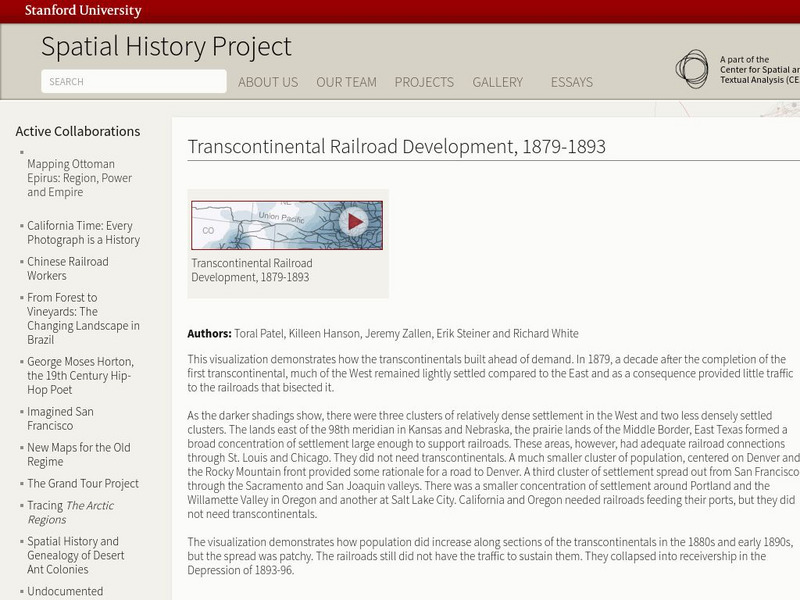

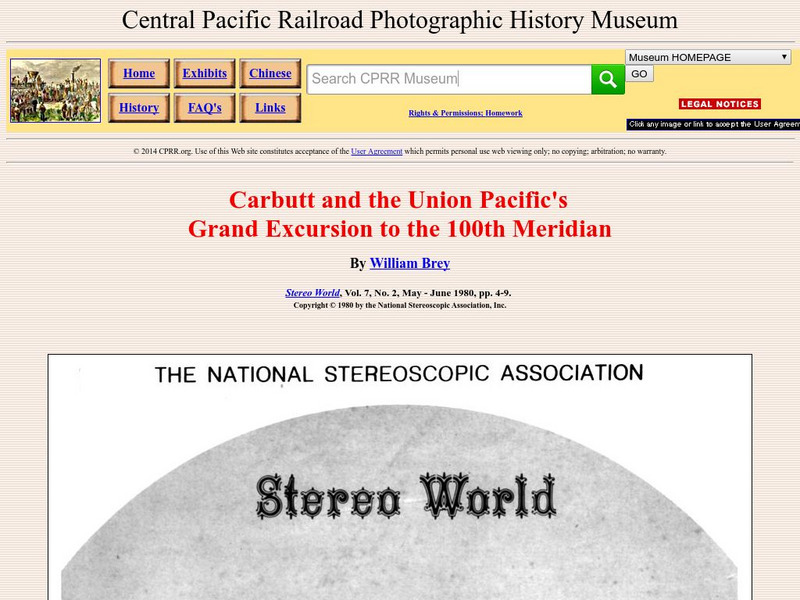
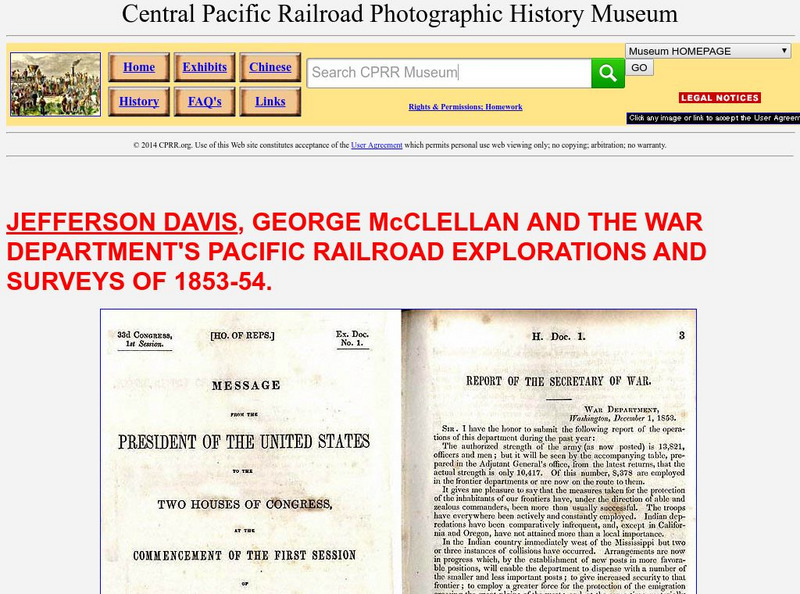

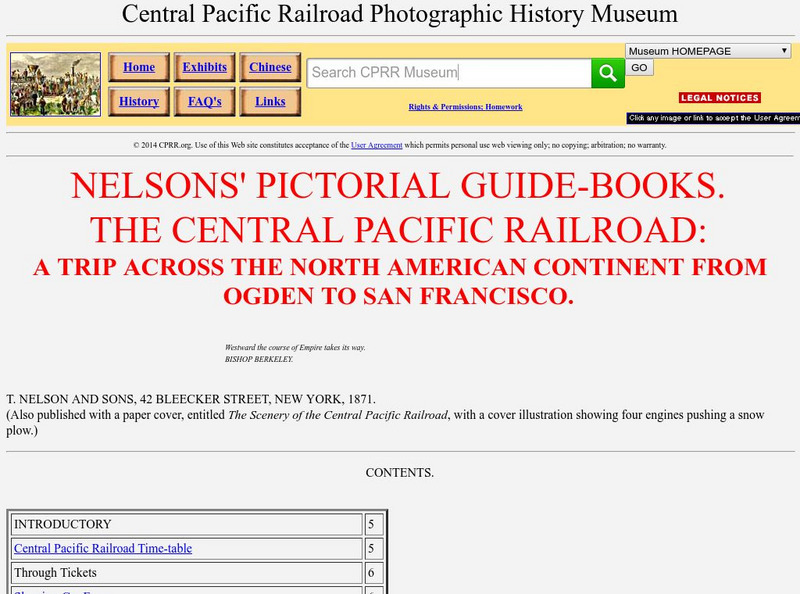
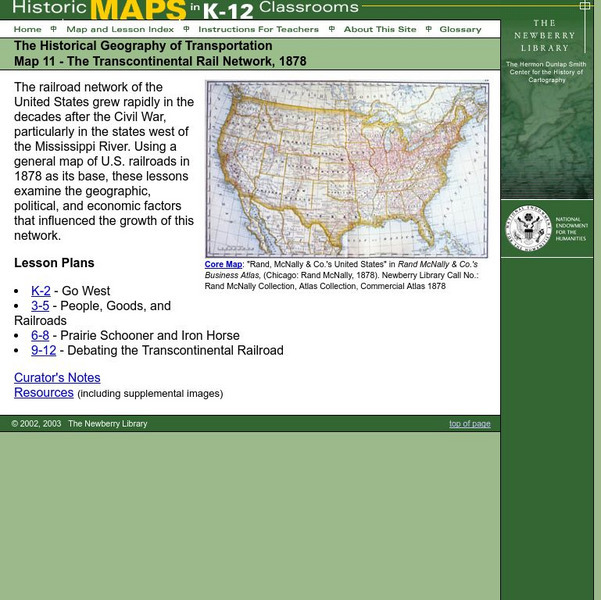

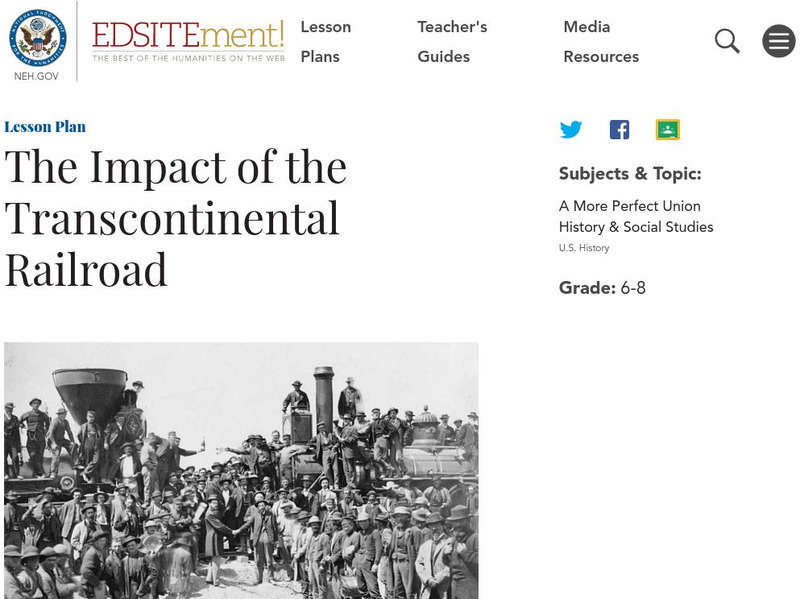


![Digital History: Civil War in Kansas [Pdf] Website Digital History: Civil War in Kansas [Pdf] Website](https://d15y2dacu3jp90.cloudfront.net/images/attachment_defaults/resource/large/FPO-knovation.png)
